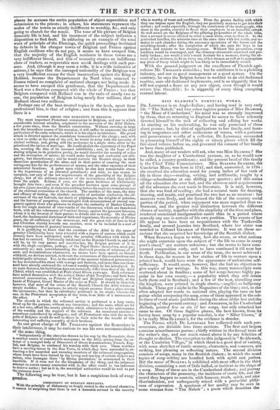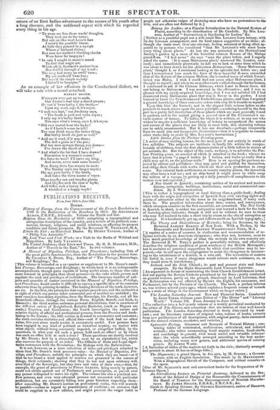MISS DLAMIRE ' S POETICAL WORKS.
Da. LONSDALE is an Anglo-Indian ; and having read in very early life " The Nabob," and two other fugitive poems of Miss BLAMIRE, " the Muse of Cumberland," his mind was so strongly impressed by them, that on returning to England he seems to have solemnly devoted himself to the task of collecting and editing her works. At starting on his undertaking, be was only possessed of three short poems ; but, by dint of applications to her family, and hunt- ing in magazines and other collections of verses, with a patience and perseverance worthy of a collector, Dr. LONSDALE succeeded in possessing himself of the eighty or ninety pieces which fill the fair-sized volume before us, and procured the consent of her family to have them published. And, many of our readers will ask, who was Miss BLAMIRE ? She was the daughter of a Cumberland yeoman, or, as he would now be called, a country gentleman ; and the present head of this family is the Chief Tithe Commissioner. Miss SUSANNA BLAMIRE, the Cumbrian Muse, was born in 1747, and died, unmarried, in 1794 : she received the education usual for young ladies of her rank of life in those days—reading, writing, and arithmetic, taught by a village-schoolmaster at one shilling per quarter ; and this seems all the education she ever had, and the above-named acquirements all the advances she ever made in literature. It is said, however, that she was fond of reading ; she had a natural taste for dancing, drawing, and music, and practised the two last as an amateur : her manners were lively, and she formed the life of the country social parties of the period, when enjoyment was more regarded than re- finement, and the greater real distinction between the different classes of society, together with the simplicity of the time and place, rendered occasional amalgamation easier than in a period where scarcely any one is certain of his own position. The events of her life appear to have been an acquaintance with the Tankerville family, and several journies into Scotland, where her sister was married to Colonel GRAHAM of Gartmore. It was on these oc- casions that she acquired her knowledge of the Scottish dialect. When SUSANNA began to write, how she wrote, or what notions she might entertain upon the subject of " the life to come in every poet's creed," are matters unknown ; but she seems to have com- menced composition early, and to have continued it till near her death. Publication, in our sense of the term, she never achieved : in those days, for women in her station of life to venture upon a printed book, would have worn the appearance of unfeminine self- sufficiency. It would seem, however, that she had no objection to give copies of her writings. In this way, many manuscripts were scattered about in families ; some of her songs became highly po- pular in her own county,— a popularity which they still retain both there and in Scotland ; and a few of the best, travelling over the kingdom, were printed in single sheets,—anglice, as halfpenny ballads. These got a niche in the Magazines of the time ; and, as she often adapted her words to national airs, playing the tune on her guitar whilst composing the song, some of them appeared in the col- lections of vocal music published during the close of the last and the beginning of the present century : and ANDERSON, in his Cumberland Ballads, printed five or six of her songs, but only attached her name to one. Of these fugitive pieces, the best known, from its having been sung by a popular vocalist, is the " Siller Crown," if it he really Miss BLAMIRE'S, for the evidence is slender. The Poems, which Dr. LONSDALE has collected with such per- severance, are divisible into three sections. The first and largest contains miscellaneous poems; chiefly written in the formal taste of the writer's day, and not much raised above it by any felicities of thought or diction. The exception to this judgment is " Stoklewath, or the Cumbrian Village," in which there is a good deal of variety, with some sketches of rustic scenery, characters, and manners, not striking, but pleasing as reflecting nature. The second division consists of songs, many in the Scottish dialect ; in which the usual topics of song-writing are handled both with spirit and pathos. But the muse of SUSANNA is exhibited with most effect in the third division, containing a sort of little ballad, or incident in the shape of a song. Many of these are in the Cumberland dialect ; and portray the characters of the peasantry, the incidents of rustic life, and the moral they happen to contain, with humour, truth, spirit, and nice discrimination, not unfrequently mixed with a proverbial pitbi ness of expression. A specimen of her
quality may be seen in
some stanzas from "The Nabob " ; a poem which describes the.
return of an East Indian adventurer to the scenes of his youth after long absence, and the saddened aspect with which he regarded every thing in his age.
"To wean me free these mufti' thoughts, They took me to the town ; But sair on ilka weel-kenti'd face I miss'd the youthfu' bloom. At balk they pointed to a nymph Wham a' declared divine; But sure her mother's blushing cheeks Were fairer far laugsyne " In vain I sought in music's sound To find that magic art, Which oft in Scotland's ancient lays Has thrill'd through a' my heart : The saeg had mony an artfu' turn ; My ear confess'd 'twas fine; But miss'd the simple melody 1 listen'd to langsyne."
As an example of her effusions in the Cumberland dialect, we will take a tale with a moral attached.
BARLEY BROTH.
If tempers were put up to scale, Our Jwohn'a wad bear a duced preyce;
He vow'd 'twos barley i' the broth,— Upon my word, says I, it's reyce.
"I mek nea faut," our Jwohnny says, " The broth is guid and varra ueyce; I only say it's barley broth." Tou says what's wrang, says I, it's reyce.
"Did ever mortal hear the ley ke ! As if I hadn't sense to tell !
Tou may think reyce the better thing, But barley broth dis just as well."
"And sae it mud, if it was there; The deil a grain is i' the pot ;
But tou mun ayways threep yen down—
I've drawn the deevil of a lut !"
"And what's the lot that I have drawn?
Perversion is a woman's ncame!
83e fares-te-weel! 1'11 serve my king, And never, never mair come hcame."
Now Jenny frets free mworn to nett; The Sunday cap's nee longer neyce She aye puts barley i' the broth,
And hates the varra neame o' reyce.
Thus treyfles vex and treyfles please, And trey flee mek the sum o' leyfe; And trifles mek a bonny lass A wretched or a happy weyfe



























 Previous page
Previous page